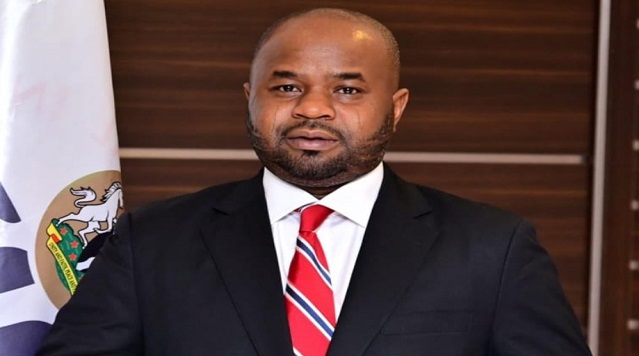E-Financial
eNaira: CBN Rallies PSPs, Fintechs to Deepen Adoption

The Central Bank of Nigeria (CBN) yesterday said it was working with key stakeholders in the payment system ecosystem to boost the adoption of its digital currency known as the eNaira.

The stakeholders, particularly Payment Service Providers (PSPs) and a community of fintech groups, after a one-day engagement with the apex bank in Lagos, resolved to partner to ensure more adoption of the CBDC in the country.
Speaking at the meeting, Mrs. Rakiya Mohammed,director, Information Technology Department (ITD), CBN, explained that the apex bank was neither competing with the Deposit Money Banks (DMBs) nor other actors in the Nigerian payment system environment.
Essentially, the engagement was in continuation of the bank’s strategy to bring all stakeholders on board what Mohammed described as a journey.
She said the CBN remained open to suggestions and innovation aimed at adding value to the eNaira and improving the user experience.
The CBN director urged the payment service providers (including the large community of fintech groups) to find more innovative ways to support members of the public, where possible, in the onboarding process and use of eNaira as well as develop solutions for offline eNaira functions including cards, wearables, USSD, among others.
While also admonishing the licenced PSPs to create additional use cases for the eNaira, she tasked licenced PSPs to create additional products and services across the full spectrum of the financial system using eNaira.
Mohammed further disclosed that the full implementation of the eNaira, which started with the onboarding of the banked, would be done in four phases, culminating in offline eNaira payments solutions, cross-border payment and interoperability of the eNaira with those of other central banks.
However, their taking turns, representatives of the different stakeholder groups welcomed the introduction of the eNaira and expressed support for its adoption and use.
They also made value-added proposals for the market and integration process to drive financial inclusion by bridging the gap between the banked and the unbanked.
Also, going forward, the CBN team and the different stakeholder groups agreed to meet periodically to review the progress made to enable more Nigerians access eNaira.
On the CBN team were the Director, Banking Services Department, Samuel Okojere; Director, Payment System Management Depart, Musa Jimoh; Director, Risk Management, Dr. Blaise Ijebor; the Director, Financial Policy and Regulations Department, Mr. Chibuzor Efobi; and the Special Adviser to the CBN Governor on Payment Systems, Mary Fasheitan.
The different groups present at the engagement were from Payment Service Banks, Switching and Processing companies; Mobile Money Operators; Payment Solution Service Provider; Payment Terminal Service Providers; and Super Agents.
Also present were representatives of the Chartered Institute of Bankers of Nigeria (CIBN); the Nigerian Inter-Bank Settlement System (NIBSS); Shared Agent Network Expansion Facilities (SANEF); and the Committee of banking Industry Heads.
CBN Governor, Mr. Godwin Emefiele, had said the eNaira would support a resilient payment ecosystem, encourage rapid financial inclusion, reduce the cost of processing cash, enable direct and transparent welfare intervention to citizens and increase revenue and tax collection. Also, he had said the eNaira would facilitate diaspora remittances, reduce the cost of financial transactions, and improve the efficiency of payments.
Emefiele added, “Therefore, the eNaira is Nigeria’s CBDC and it is the digital equivalent of the physical naira. As the tagline simply encapsulates, the eNaira is the same naira with far more possibilities.”
Meanwhile, as part of efforts by the federal government to make sure every eligible Nigerian own a bank account and be financially included, the central bank yesterday commenced the digital inclusion drive for woman and youths in Bayelsa State.
Introducing the scheme in Kaima, Kolokuma/Opokuma local government area of the state, the state Governor, Senator Douye Diri, advised rural dwellers in the state that the only way they could benefit from various governments micro-credit and empowerment programmes and be financially included was by having valid bank accounts.
The governor who encouraged the rural dwellers in the state to take advantage of the CBN financial inclusion drive to open their bank accounts, noted that the present administration in the state has various financial and empowerments programmes, and others in partnership with the federal government, which can only be access through a bank account.
Diri, who was represented by a Permanent Secretary in the office of the Secretary to the State Government, Mr. Anthony Orwells, said, “There are a number of empowerment programmes, a number of them the state government is in partnership with the CBN and other federal institutions while some of them are entirely by the state government.
“However, you will need a bank account to be financially included through a bank account, hence the need to encourage financial inclusion to ensure everyone including the rural dwellers benefits and is carried along in the scheme of things.”
In his speech, Yusuf Yila, director, Development Finance Department of the CBN, said the nation’s apex bank has discovered that most rural dwellers could not be captured for various empowerment initiatives because of bank accounts, which necessitated the financial inclusion drive.
Represented by Mrs. Augustina Osuya, head of Development Finance, CBN, Yenagoa branch, he explained that the financial inclusion drive was expected to, among other things, improve financial literacy and build awareness on the benefits of the use of digital financial services and contribute to increased access to payments, savings and credit enhancement opportunities for rural women and youth across the country leveraging digital platforms.
He pointed out that the scheme was aimed at empowering and bringing more women and youth across Nigeria into the finance ecosystem in line with the CBN digital financial inclusion project.
While calling on the rural women and youths to grab the opportunity to open their bank accounts, he urged financial institutions to join and take the exercise seriously to bring all financially excluded on board.
In her remark, the Woman Leader of Kaiama Mrs Tonbra Egbegi, commended the CBN for bringing the initiative to their doorsteps and saying that the drive will give the rural women and youth the opportunity to open their bank accounts conveniently without having to travel to the state capital.
E-Financial
Ecobank Offsets Repayment of $300m Eurobond Notes

Ecobank Nigeria Limited has fully repaid bondholders who validly tendered their notes ahead of the February 2026 maturity date.

The bank announced the successful completion of its tender offer, under which it prepaid approximately $245 million of its $300 million Eurobond, representing more than 80 per cent of the total issuance.
According to a statement, the transaction relates to the 7.125 per cent Senior Note Participation Notes due February 2026.
Ecobank Nigeria Limited said it launched a tender offer to eligible noteholders in respect of the outstanding $150 million on the bond on November 27, 2025, providing them with an opportunity to redeem their holdings ahead of the original maturity date of 16 February 2026.
It stated that the early and late tender participation deadlines were 11 December 2025 and 29 December 2025, respectively.
According to the bank, holders of notes validly tendered and accepted received a cash consideration of $1,000 per $1,000 in principal amount, in addition to accrued interest from the last interest payment date up to, but excluding, the final settlement date of 31 December 2025.
Following completion of the offer, the bank said the outstanding principal amount of the notes has been reduced to approximately $55.092 million.
The bank also stated that the initiative reflects Ecobank Nigeria’s proactive approach to liability management and prudent balance sheet optimisation.
The tender offer was conducted with Renaissance Capital Africa (Renaissance Securities Nigeria Limited) acting as financial adviser and dealer manager, while Sodali & Co Limited served as tender agent.
The notes were originally issued by EBN Finance Company B.V., with limited recourse to the issuer, for the sole purpose of financing the purchase of the $300 million 7.125 per cent Senior Note due 2026 issued by Ecobank Nigeria Limited.
E-Financial
Senders Now to Pay N50 Stamp Duty – GT Bank

GTBank has reminded customers of the new stamp duty rules under the Nigeria Tax Act 2025, which take effect from January 1, 2026.

According to an email received by a GT Bank customer on Tuesday, under the new regulation, the ₦50 stamp duty on electronic transfers of ₦10,000 or more will now be paid by the sender, not the recipient.
GTBank clarified that certain transactions will remain exempt from the charge.
“Please be reminded that, in line with the Nigeria Tax Act 2025, which took effect from January 1, 2026, the ₦50 stamp duty on electronic bank transfers of ₦10,000 and above is paid by the sender of the transaction and not the receiver.
“These include transfers below ₦10,000, salary payments, and transfers between a customer’s own GTBank accounts,” the message read.
The bank also noted that the stamp duty is separate from regular transfer fees and will be clearly displayed before completing any transaction, ensuring transparency for customers.
GTBank encouraged customers to review their transfers carefully and plan accordingly, as the update is part of nationwide efforts to streamline compliance with the Nigeria Tax Act 2025.
E-Financial
Zacch Adedeji says Rebranded NRS will Overhaul Revenue Administration

Nigeria Revenue Service (NRS) says its replacement with the defunct Federal Inland Revenue Service (FIRS) will overhaul the architecture of the country’s revenue administration.

Dr Zacch Adedeji, the executive chairman of NRS, said this in a television interview monitored from Abuja.
The News Agency of Nigeria (NAN) reports that the provision of the recently enacted tax reform laws changes the nomenclature of the country’s apex tax authority from FIRS to NRS.
According to Adedeji, NRS is not branding. It is a total institutional upgrade moving from fragmented revenue administration to a modern, digitalised, centralised and intelligence-driven system.
He said that under the new framework, multiple tax and revenue-related functions previously spread across agencies have been consolidated, with a stronger emphasis on data integration, automation, and reduced human discretion.
He dismissed allegations that the country’s newly enacted tax reform laws were altered after passage by the National Assembly.
“Only the officially gazetted Acts carry legal authority and are binding on taxpayers and administrators,” he said.
The NRS boss said that an Act of the National Assembly only became effective after Presidential assent and official gazetting, with the gazetted version constituting the authoritative text in the event of disputes.
“Revenue agencies, courts, and taxpayers are therefore guided solely by the gazetted law, not draft bills, committee reports or chamber debates.
“Neither the executive nor the revenue authority has any incentive or legal capacity to alter the law after passage,” he said.
Adedeji said that the overhaul of the NRS is also designed to support the Federal Government’s broader fiscal objectives.
According to him, Nigeria’s tax-to-GDP ratio has improved in recent years, rising to about 13.5 per cent as at October 2025.
“But it remains below the African average and well short of levels seen in peer emerging markets,” he said.
Adedeji said that the overall aim is on taxing profits and returns rather than capital or investment.
“We are not going to tax poverty; we want to tax prosperity,” he said.

 News2 days ago
News2 days agoCourt Sends Faleti, Ex-Lagos Director to Jail for Stealing ₦48.9m from Access Bank

 E-Financial2 days ago
E-Financial2 days agoRemita Powers over ₦100 Trillion in Payments as Nigeria’s Digital Economy Expands

 News3 days ago
News3 days ago974 Nigerians Face Imminent Deportation from Canada Amid Enforcement Surge

 E-Financial2 days ago
E-Financial2 days agoWhy 2026 Must Be the Year Nigeria’s Economy Works for All

 General News3 days ago
General News3 days agoHouse of Reps Releases Certified Copies of Tax Reform Acts amid Gazette Discrepancy Claims

 E-Financial2 days ago
E-Financial2 days agoFlutterwave Acquires Nigeria’s Mono in $25m-$40m All-Stock Deal

 E-Financial2 days ago
E-Financial2 days ago2026: SEC to Review Rules to Incentivise SME Listings

 General News2 days ago
General News2 days agoNigeria Targets Satellite-to-Mobile Services in Draft Spectrum Roadmap






















